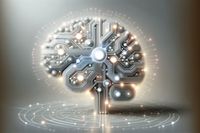China and the US Take Different Tracks in the Race for AI Supremacy
China and the US have different approaches in the race for AI supremacy, with the emergence of ChatGPT causing a stir in China.

The Rise of ChatGPT in China
The rise of ChatGPT, a chatbot developed by US-based OpenAI, has become a significant topic of discussion in China. Although it was officially launched in late 2022, its unprecedented growth in 2023 caught the attention of Chinese social media.
China has set the goal of becoming the global AI leader by 2030, and the rapid adoption of AI in various sectors has been evident in the country. However, ChatGPT's success has raised questions about China's ability to keep up with the advancements in generative AI.
Experts have proposed different explanations for China's lag in developing similar AI technologies. Some attribute it to the fast-paced nature of Chinese tech startups, which prioritize quick applications over lengthy research and development. Others point to the complexities of the Chinese language, making language model training more challenging.
Challenges in Developing AI Platforms in China
Political sensitivities and the closely monitored online environment in China have posed challenges in developing platforms like ChatGPT. In 2023, Chinese authorities introduced rules for generative AI, emphasizing that AI-generated content must align with the "core values of socialism" and not undermine state authority or spread false information.
Chinese tech companies have launched their own chatbots, but they face limitations and restrictions imposed by the state. For example, asking Baidu's Ernie chatbot certain questions about Chinese leadership can lead to the conversation being immediately shut down.
Recent incidents, such as an AI tablet generating critical notes about Mao Zedong, have served as warnings that AI models must operate within the guidelines and regulations of China's strictly governed cyberspace.
China's AI Revolution Continues
Despite the challenges, China's AI revolution is far from losing momentum. AI developments are impacting all layers of Chinese society, from businesses and entrepreneurs to the general public. AI-powered social media, live streaming apps, and e-commerce platforms play a crucial role in China's digital economy.
New AI technology has enabled the creation of deepfake influencers, offering new opportunities for small Chinese entrepreneurs. Virtual livestreamers are also being utilized to boost rural economic development, allowing farmers to sell their products internationally.
Chinese authorities are also working with big tech companies to make Communist party messages more appealing and accessible. State newspaper the People's Daily has introduced a virtual presenter.
Different Approaches to AI in China and the West
The emergence of ChatGPT highlights the different approaches to AI between China and the West. China emphasizes a balance between economic growth and political stability, with a focus on cyber sovereignty and maintaining power with the party. In contrast, the West prioritizes AI applications that promote individualism, personal autonomy, and decentralization.
It is important to shift the focus away from the perceived "AI race" between the West and China and instead understand and learn from their different approaches. Competitive thinking and geopolitical implications should be surpassed to foster cooperation and mutual understanding.
Manya Koetse, founder of What's on Weibo and a sinologist focused on China social trends & digital culture, emphasizes the need to go beyond competitive thinking and explore the unique paths taken by China and the West in the race for AI supremacy.



